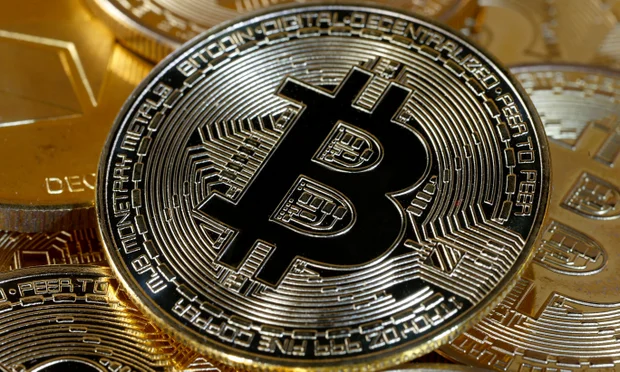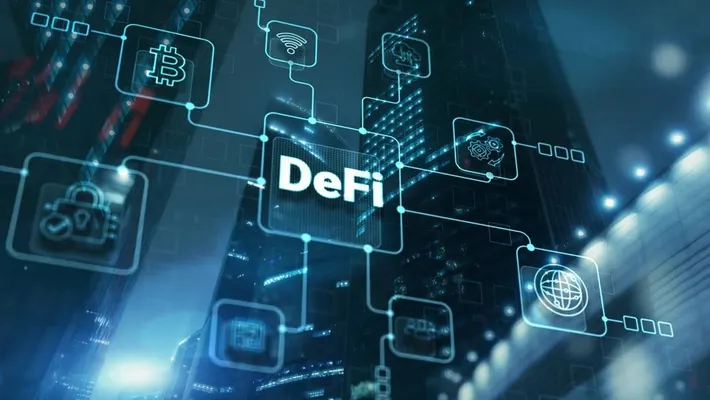Picture this: You stand at the door of a bank, holding a gold brick. You ask for a loan. The banker sneers, refusing to accept it as collateral.
That’s how today’s financial institutions treat Bitcoin—digital gold—with policies that refuse to acknowledge its value as collateral.
Fine. Good. Because banks just became irrelevant.
The drama that is playing out isn’t just a story of old-world institutions clinging to outdated rules.
It’s a reminder that the future of finance doesn’t need their permission. Decentralized finance (DeFi) makes traditional systems irrelevant. And at its core lies Bitcoin, waiting to unleash its full potential in Web3’s Internet of Money.
TradFi’s Flimsy Feifdom
Banks won’t let you borrow against Bitcoin, but they will let you borrow against stocks.
Why? Stocks are tied to the centralized economy, controlled by regulations and gatekeepers. Bitcoin, on the other hand, is a borderless, censorship-resistant, and non-sovereign asset.
To legacy institutions, that independence is a threat. They can’t manipulate Bitcoin the way they do fiat currencies or securities. So they are doing what they can to suppress the innovations in finance that are inevitable.
And it goes beyond refusing to let you borrow directly against your Bitcoin.

In April 2024, the Depository Trust & Clearing Corporation (DTCC) announced a 100% haircut on ETFs backed by Bitcoin or other cryptocurrencies. Starting April 30, these securities will hold zero collateral value within DTCC’s clearing and settlement system, barring financial institutions from using them for credit or financing.
Framing the decision as risk management, the DTCC cited concerns over volatility and regulatory uncertainty. Critics argue this move underscores legacy finance’s resistance to change, further highlighting the gap between traditional systems and the innovation-driven world of decentralized finance.
Yet, the demand to borrow against Bitcoin remains. And it is being met by DeFi.
DeFi: The Financial Frontier
DeFi is an alternate universe where you don’t need permission to leverage your Bitcoin.
Instead of bowing to a banker’s arbitrary rules, you open your laptop, connect to a decentralized protocol, and borrow funds against your Bitcoin with no credit check, no paperwork, and no waiting period.
That’s the magic of DeFi.
Platforms like Aave, MakerDAO, and Compound allow Bitcoin holders (sorry I meant hodlers) to stake their assets (often in wrapped form, like wBTC) as collateral for loans.
You can borrow stablecoins like DAI or USDT to pay bills, trade, or invest—without selling your Bitcoin and losing its upside potential. And often without triggering a taxable event (talk to your accountant).

These aren’t just isolated innovations. They’re part of an ecosystem that operates 24/7, globally accessible to anyone with an internet connection. No gatekeepers, no middlemen—just code running the financial world like clockwork.
Where Bitcoin Meets DeFi
While much of DeFi innovation happens on Ethereum, Bitcoin is beginning to find its own DeFi pathways. Platforms like Sovryn, built on Bitcoin’s Rootstock (RSK) sidechain, let users directly collateralize Bitcoin without wrapping it. Similarly, Stacks, a smart contract platform anchored to Bitcoin, powers lending protocols like Arkadiko.
These platforms let Bitcoin fulfill its destiny—not just as digital gold but as programmable money. And they signal a future where Bitcoin’s financial ecosystem could rival the scope of Ethereum’s DeFi revolution.
Examples of DeFi Platforms Accepting Bitcoin Collateral
Bitcoiners already have options for using their assets as collateral:
- Aave and Compound: Use wrapped Bitcoin (wBTC) to borrow stablecoins or other cryptocurrencies.
- MakerDAO: Mint decentralized stablecoins (DAI) by staking wBTC as collateral.
- Sovryn: A Bitcoin-native platform enabling direct loans and yield farming.
- Hodl Hodl: Peer-to-peer lending, no intermediaries, and no wrapping needed.
- Arkadiko: Built on Stacks, it lets Bitcoiners collateralize BTC to mint stablecoins.
These platforms highlight a critical advantage of Web3—permissionless innovation.
Unlike traditional finance, anyone can build and improve these protocols, creating new opportunities for users worldwide.
A New Kind of Freedom
The real power of Bitcoin-backed DeFi lies in its potential to liberate individuals from the control of centralized systems. Think about the protesters in Canada whose bank accounts were frozen or ordinary citizens in inflation-ravaged countries who saw their savings evaporate overnight.
For them, Bitcoin isn’t just an investment—it’s a lifeline.
DeFi builds on that lifeline. It empowers users to borrow, lend, and transact without the risk of having their assets frozen or seized or printed into worthlessness by a central bank.
It is financial sovereignty in action—a system that doesn’t discriminate based on nationality, politics, or even a credit score.
The Road Ahead: Building DeFi on Bitcoin
For Bitcoin to truly shine in the DeFi world, it needs more dApps developed on layer 2.
While Ethereum dominates DeFi today, Bitcoin’s unmatched security and decentralization make it the ultimate foundation for a global financial system.


The key is innovation: building tools like smart contracts and sidechains to expand Bitcoin’s use cases without compromising its core principles.
Projects like Sovryn and Stacks are leading the charge, but we need to build on top of them into real world use cases.
Bitcoin L2’s need more developers, more capital, and more community support to unlock DeFi’s full potential on the network.
Why the Old System is Irrelevant
Regardless of whether DeFi ever grows big on Bitcoin remains to be seen.
Regardless, the refusal of traditional institutions to embrace Bitcoin as collateral doesn’t weaken Bitcoin. It weakens them.
DeFi has already proven that borrowing and lending can happen without banks. And as these systems grow, they’ll offer financial tools far beyond what legacy finance can imagine.
The future is clear: A world where anyone can collateralize their assets, secure loans, and transact globally—without asking for permission.
Bitcoin and DeFi are leading us there, one block at a time.



